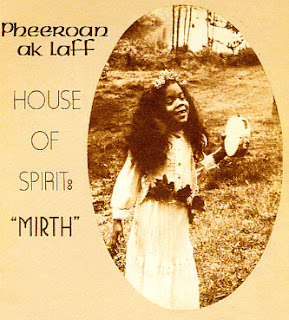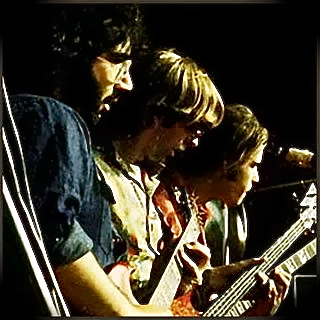If you have read this blog before, and hadn't already surmised as much, Disaster Amnesiac is a drummer. As such, I love drums, and love listening to drums. I have amassed quite a few recordings that are of either a "solo drums" or "drummer featured" nature, and have often wanted to blog about them. That said, I realize that most people probably don't want to read at length about these types of recordings. Therefore, I have initiated the Up Half Known Roads: Solo Drumming Records series, in which two or three separate recordings of this type will be described and enthused about per installment.
Please insert drummer joke here: , and read on.
Pheeroan ak Laff: House of Spirit: "Mirth"
ak Laff was only in his early 20's when this righteous slab of percussive interplay was waxed, but, he had already spent time studying with Motown's Funk Brothers, Tribe Collective, at the University of Michigan, and, on the East Coast, with Free Masters such as Rashied Ali, Wadada Leo Smith, and Oliver Lake. Needless to say, he had chops and musicality to burn, and both are on display here. Using only voice and heaps of drums, live-tracked and overdubbed, Pheeroan, with the help of Executive Producer Lake, concocted this fierce percussive display over two days in 1979, dedicated to a fallen brother of the Vietnam Conflict variety. Masterful use of mallets on toms, snare rudiment techniques, full-on trap kit beat funkiness, African drums, and chanted lyrics all mix and mesh for a spiritual work out. The vibe is definitely one of incantation and personal ritual drum jamming, one which will be familiar to any drummer who has spent time alone behind the kit. Disaster Amnesiac is sure that humans of the non-drummer variety would also be moved by its slamming rhythmic mojo. Spiritual mirth!
Janet Ogg: Drums is Art
In the post immediately preceding this one, Noh Mercy drummer Tony Hotel gives and extensive description of her nearly fifty year drumming career. Also take note that Hotel and Janet Ogg are one in the same person, and this CD, a sonata for drums, really, is her most current work. Drums is Art is a Jazz drumming-centered affair, in which Ogg displays her extensive skills on the trap set, driving tunes that feature piano, electric keyboard, sampled percussion and pure electronic sound washes. Bop, Modal, Free, and Harmolodic approaches to the art of trap kit playing are all touched upon.Ogg swings her kit through all of it, moving from intricate poly rhythms a la Tony Williams to spacial abstraction reminiscent of the Modern Compositional style, always displaying a robust, personal sound. She also adds spoken lyrics to the mix on occasion, and her oratory on No Thinking may be the best manifesto for creative vision I have ever heard. Hers is as personal a vision as you can find, and Disaster Amnesiac loves it accordingly.
In concluding this inaugural edition of the Up Half-Known Roads series, I'd just like to say keep bangin' the gong, and stay tuned for more percussion-centered spieling from Disaster Amnesiac, along with the usual Describing and Enthusing that you've grown accustomed to.




